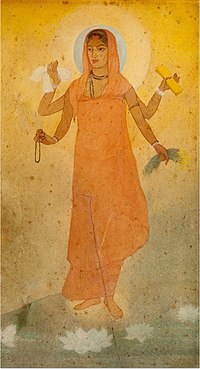National personification

A National personification are concepts such as nations, emotions, and natural forces/phenomena, such as seasons and weather in relation to personae characteristics of a state or the people(s) it inhabits. It may appear in political mascots and cultural depictions.
List of national personifications[change | change source]
| Location | Image | Personification | Animal used for the same purpose |
|---|---|---|---|

|
Banga Mata (lit. Mother Bengal).[1] | Bengal tiger[2] | |

|
Europa or Europa regina | Zeus as a white bull | |

|
Hellas | ||

|
Bharat Mata ("Mother India") | Bengal tiger, Indian elephant | |

|
Ériu, Banba, Fódla, Kathleen Ni Houlihan, Hibernia, The Old Woman of Beare[3] | ||

|
Handala | ||

|
Pak Watan - "A term of Endearment for Pakistan" which is "Mumlikat-e-Khudadad" ('God-Given State') | 
| |

|
Britannia (United Kingdom), John Bull (England), Dame Wales (Wales) | The Lion and the Unicorn (England and Scotland), Bulldog (United Kingdom), Welsh dragon (Wales) | |

|
Uncle Sam (government personification), Lady Liberty, Columbia, Johnny Reb (The South, obsolete), Billy Yank (The North, obsolete), Brother Jonathan (New England, obsolete) | Bald Eagle, Timber rattlesnake (American Revolution, obsolete) |
Related pages[change | change source]
- National emblem, for other metaphors for nations.
References[change | change source]
- ↑ Ahmed, Salahuddin (2004). Bangladesh: Past and Present. APH Publishing. p. 310. ISBN 8176484695. Retrieved July 11, 2012.
- ↑ "NATIONAL SYMBOLS". Bangladesh Tourism Board. Bangladesh: Ministry of Civil Aviation & Tourism. Archived from the original on 2016-12-28. Retrieved 2015-09-10.
- ↑ O'Rourke Murphy, M. & MacKillop, J. (2006). An Irish Literature Reader: Poetry, Prose, Drama.
